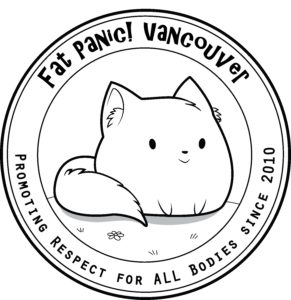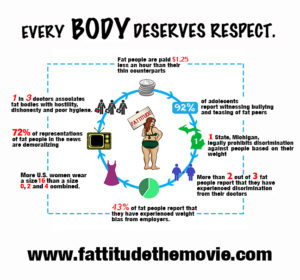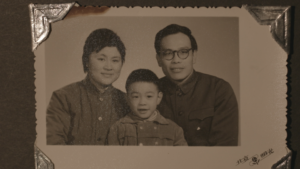Nothing justifies oppression – an interview with Kalamity Hildebrandt
- May 18, 2018
- /
- Blog

With our Fattitude event approaching on May 31st, Kalamity Hildebrandt from community cause, Fat Panic!, a local organization dedicated to ending the oppression of fat people, provided some insight on the issues addressed in the film.
Can you briefly describe what the fat-positive movement is?
There is no one fat-positive movement! There are a range of movements and approaches that could all fall under this umbrella. These range from the most mainstream that seek to open up the category “beauty” a little – but not too much – and increase fat access to consumer goods. There are those who see this work primarily as a rights movement – trying to challenge the ways that legal and policy structures discriminate against fat people within our current social and political framework. And then there is the type of work that we at Fat Panic! do. We are definitely interested in ensuring that fat bodies are loved and appreciated (as all bodies should be), that fat people can access clothing and public spaces, and we are up for tackling discrimination. But what we are ultimately interested in is fundamentally changing the social and political framework we live within. We understand anti-fatness to be intimately tangled up with the bigger matrix of oppression, and we believe that in order to end fat oppression we must work to dismantle all forms of oppression, including (but totally not limited to) colonialism, white supremacy, ableism, sexism and its close friends: cissexism, sex binarism and heterosexism, and, of course, the capitalist system that needs all of these forms of oppression to order society and keep profit flowing to the wealthy.
What kinds of fatphobia does your work focus on?
Fatphobia isn’t a word I use very often when talking about our work. Fat Panic! focuses on ending fat oppression. Fat oppression as a system of injustice certainly encourages and uses fear of fatness (fatphobia) but anti-fatness is not primarily about fear of fat any more than sexism is primarily about fear of women. Oppressive systems like white supremacy, ableism or fat oppression will happily promote fear where that’s useful to them (along with hatred or shame/blame, etc.), but that’s not what oppression is at its core – oppression is about developing categories and logics that are intended to rationalize imbalances of power between groups of people. To make injustice seem logical, natural and inevitable. Fat oppression, like all logics of oppression, is about having one more strategy for creating hierarchy in our society so as to better hold people in their places within our social and economic structure. All of that said, when it comes to one-on-one conversations with people, there is no doubt that I and other organizers with Fat Panic! do end up spending a lot of time helping people process their fears and anxieties around fatness. Working to unearth internalized anti-fatness is a necessary part of healing for people of all sizes, and for non-fat people it is a necessary part of learning to be in solidarity with us.
Some of our efforts include trying to address anti-fatness in the health care system by educating future health care providers and offering workshops to community groups on how fat justice is relevant to their work. For example, we regularly train volunteers at the UBC Sexual Assault Support Centre on fat oppression and its relationship to sexualized violence.
What is your response to people who argue that fat is an indicator of poor health?
My response is generally twofold and in this order.
First: I note that while the “fat=unhealthy” equation is certainly the most popular anti-fat logic used these days to try to justify fat oppression, in fact the scientific evidence does not support this simplistic view. And, as more and more health care providers and researchers do the work of challenging anti-fatness in mainstream medicine, they are producing more and more well researched books and articles and well-designed studies for the general public to learn from. Fat people are generally very interested in learning more about how to recognize and confront health myths because we suffer immensely from the anxiety that this brand of anti-fatness causes us. If you do not personally know this kind of anxiety, imagine being constantly told – and believing – that you are about to die, and that when you do it will be your own fault, and also imagine that at least some of the time, the people telling you this are clearly gleeful about the prospect of your death. It’s worth noting that this kind of anxiety is really bad for a person’s health. Non-fat people who are truly oriented towards equity are also generally very interested in learning more about the science of weight and health. We at Fat Panic! are happy to support people who want to look into this more but aren’t sure where to start.
Second: I point out that this particular piece of anti-fat logic is grounded in a more essential problem of healthism [for more information on healthism, there is an excerpt below the trailer from a workshop Kalamity facilitates on the topic], and I ask them to consider that health status should never be used as a reason to devalue any body or any life. Even if it were the case that being fat were inherently unhealthy, this could not justify oppression. Because nothing justifies oppression. Nothing.
We hope you join us on May 31st for the event. Tickets are available here.
One of the ways that I understand healthism and how it impacts our society, is that it is a tendency in our society to treat “being healthy” as much more than just something that’s desirable – we are taught to treat a very specific notion of “health” as something that is required, as a prerequisite for things like opportunity, compassion and respect. Health status is one of the ways that this society sorts bodies into useful and useless, worthy and unworthy, lives worth living or not, lives that deserve life or not.
In his article Healthism and the Medicalization of Everyday Life, Robert Crawford described a trend that he had observed: “the preoccupation with personal health as a primary – often the primary – focus for the definition and achievement of well-being; a goal which is to be attained primarily through the modification of lifestyles”
And he noted that, “Healthism is regarded to be an ideologically insidious force, which by elevating health to a super value, a metaphor for all that is good in life, reinforces the privatization of the struggle for generalized well-being.”
I want to highlight this piece: “the privatization of the struggle for wellbeing.” This insistence that health is a matter of individual responsibility – it’s important to know that this flies in the face of everything that is known in medical science about the importance of social determinants in shaping health outcomes. If you are unfamiliar with the concept of social determinants of health, it is an important to look into. In a nutshell, this is the well accepted view that the most important things determining health outcomes are social circumstances and social policy decisions. Individual choice plays a relatively small part in determining health outcomes.
But, this individualization of responsibility for health is a powerful idea in our society. We need to ask ourselves “who and what might benefit from this kind of thinking?”
Do you think that corporations might benefit? Do you think maybe this idea helps to convince us all to be consumers of things and services that will supposedly keep us healthy? And then works to valorize the “healthy choices” who can afford access to those products and services, while blaming and shaming those who cannot?
Do you think that it might benefit a government that prefers to support corporate wellbeing over taking care of the wellbeing of its citizens? Healthism serves these nations by allowing them to seem to be proactive around population health even as they continue to enact policy that directly harms marginalized communities and then blame those populations for the health disparities that arise.
Do you think that someone who is looking to feel superior to someone else – perhaps who wants to be abusive – might find this useful? Might be interested in using health status as one more tool with which to assert their superiority or justify their violence?
Under healthism, breach of this supposed “responsibility to be healthy” – physically healthy, emotionally healthy, making “healthy life choices” – brings down serious consequences on those who are targeted. At best, this world view results in shaming and blaming people for their bodies and physical and emotional health outcomes, and at worst, this can turn into a judgment that an “unhealthy” life may well be a life not worth living. And, when the group is deemed “at fault” for the health disparities experienced by its members, or is characterized as being a “burden” to the health care system or to society generally, then a life that is deemed “unhealthy” can be seen as a life that does not deserve life. Healthism is violence.
Can you think of any groups that currently face or that have historically faced these kinds of stigma, blame and violence? I can. Some of these include: Indigenous people. Racialized people of colour. Disabled people. Trauma survivors. Fat people. Deaf people. People with addictions. Poor people. Sex workers. Autistic people. This list could go on and on.

About Reel Causes Society
Reel Causes partners with filmmakers and Canadian causes dedicated to addressing global social justice issues. We host film screenings followed by a Q&A session to educate and inspire our community, and provide a forum for authentic conversation aroundF the issues that affect us locally.











